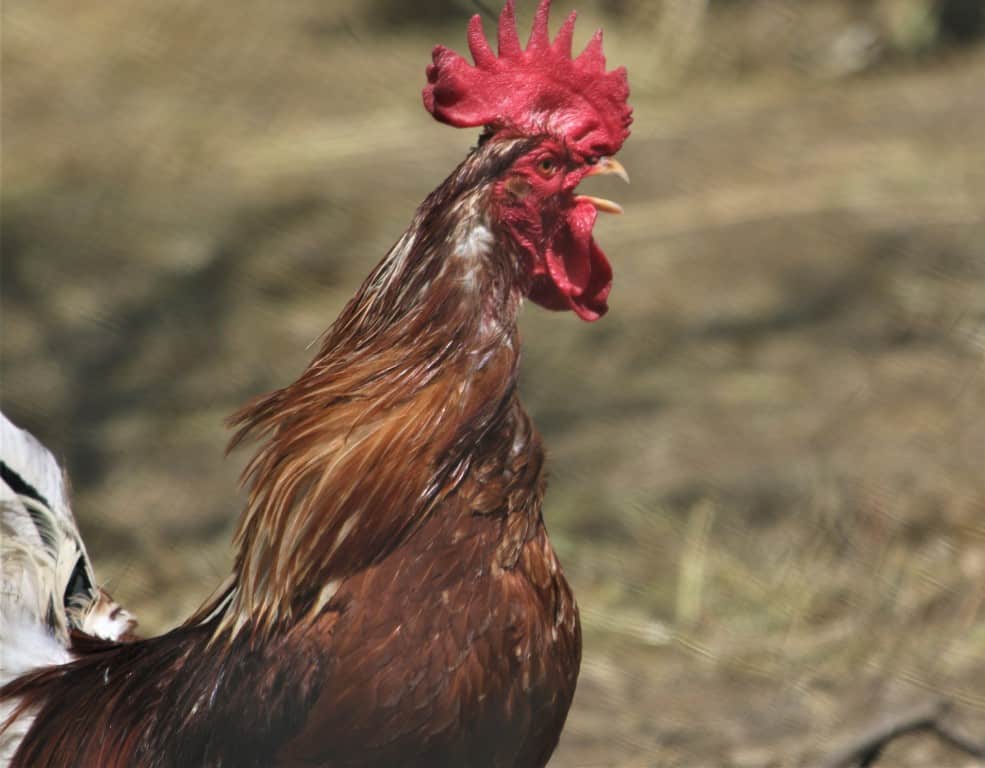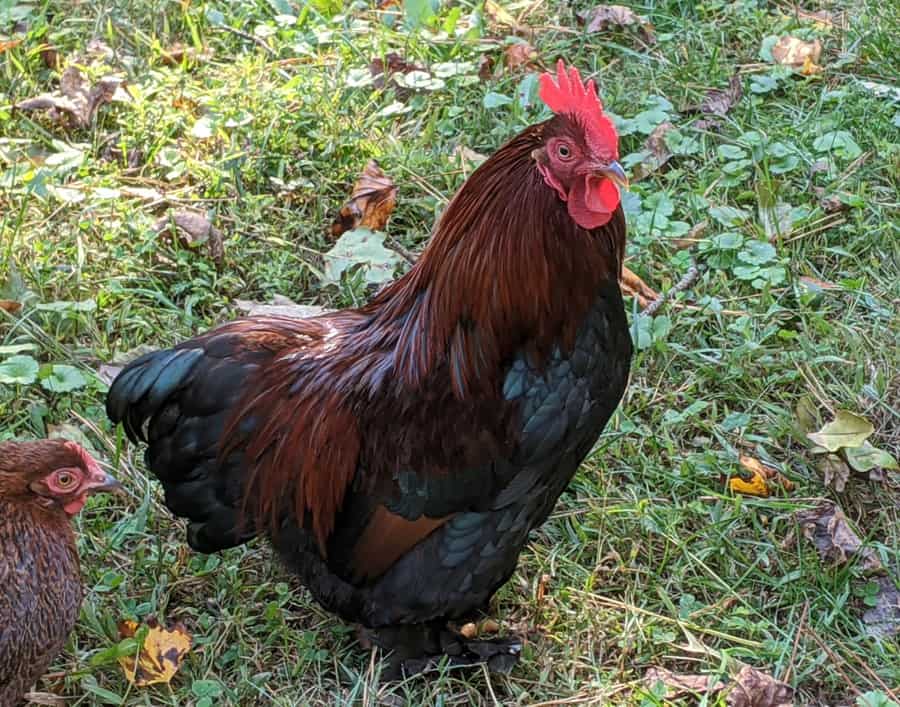
If you have never had a rooster before you’re in for a loud surprise.
Stopping a rooster from completely crowing is next to impossible. There are however ways to reduce the amount of crowing and decrease the noise level.
Through my experience with my own roosters and research, I will go over different ways on how to stop a rooster from crowing so much.
- Why Do Roosters Crow?
- 12 Ways To Stop A Roosters From Crowing
- 1. Only Have One Rooster Per Flock of Hens
- 2. Meet Your Rooster’s Basic Needs
- 3. Purchase a No Crow Collar
- 4. Keep Your Rooster In a Dark Enclosed Coop at Night
- 5. Give Your Rooster More Space
- 6. Check For Signs Predators
- 7. Play soft music on the radio
- 8. Insulate the Coop Walls
- 9. Wait Until Well After Dawn to Let Out The Flock
- 10. Keep Your Coop Clean
- 11. A Surgical Procedure to Decrow Your Rooster
- 12. Caponizing to Reduce Crowing
- Does a Hen Need a Rooster?
- Can you decrow a rooster?
- What Time of Day Do Roosters Crow?
- Do Roosters Crow In The Rain?
- Can 2 Roosters Live Together?
- Do Roosters Make a Different Sound When Danger is Nearby?
- Conclusion
Why Do Roosters Crow?
Roosters have a natural circadian rhythm that causes them to crow early in the morning. They also crow different times throughout the day.
Roosters crow to maintain a pecking order, attract mates, protect and keep the flock together, announce their presence to other roosters, and other various reasons.
12 Ways To Stop A Roosters From Crowing
1. Only Have One Rooster Per Flock of Hens
Roosters like to compete for hens so if you have multiple roosters in a flock this will increase crowing quite a bit. Reducing your flock to a single rooster can decrease crowing quite a bit.
2. Meet Your Rooster’s Basic Needs
Roosters often crow to alert you of a lack of food or water. Meet these basic needs on a consistent basis may help to reduce crowing.
3. Purchase a No Crow Collar
No crow rooster callers can be an effective cheap way to reduce the volume level of the rooster’s loud crow. It does not get rid of the crowing completely but the noise level is greatly reduced.
Hens will also try and peck the collar off to help the rooster.
Results may vary depending on the breed of rooster you have. Check my article on do roosters collars work for more information on no crow rooster collars.
4. Keep Your Rooster In a Dark Enclosed Coop at Night
Nighttime stimuli can cause a loud rooster to crow at night. Especially if the rooster is free to roam in an outdoor run at night. Keeping your flock in a dark enclosed coop at night will keep the rooster from getting spooked by outdoor noises.
If your coop does not have a dark enclosed space then you can purchase a blackout box from amazon here. However, if you already have a cage you can just put a thick blanket to cover it and this will work just as effectively.
5. Give Your Rooster More Space
If your rooster is in a small coop with little space he may be bored. This can cause him to be noisy and destructive.
Consider creating or extending a run to give the rooster more space and additional stimuli.
6. Check For Signs Predators
The main advantage of having a rooster is to protect the hens. If you are hearing a lot of crowing at night there is a good chance a predator may be trying to get in the chicken house.
Look for any signs of predators, make sure your coop is secure and take the appropriate steps to deter predators.
7. Play soft music on the radio
By playing music on the radio you cover up any outdoor noises. This will prevent noises that spook your rooster and cause him to grow.
8. Insulate the Coop Walls
By insulating the coop walls you will muffle any rooster crowing coming from the coop at night or early in the morning.
9. Wait Until Well After Dawn to Let Out The Flock
Let the flock out of the coop after dawn when the majority of crowing has already been done. This will help reduce the sound early in the mornings.
10. Keep Your Coop Clean
A head rooster may be crowing a lot because of a dirty hen house. You should clean out your coop as often as possible to keep your flock healthy and hopefully silence that noisy rooster.
11. A Surgical Procedure to Decrow Your Rooster
You can have your rooster decrowed but there are risks involved and it could be unsuccessful. This is one to avoid most likely but I had to mention it.
12. Caponizing to Reduce Crowing
Caponization is the process of removing the bird’s testies. This causes the rooster to be less aggressive.
The rooster can no longer breed and this process is usually only done when the birds are raised for meat. Again this is one to avoid but is an option.

Does a Hen Need a Rooster?
Egg-laying hens do not need a rooster. The main advantage of having a rooster for your chickens is to protect the flock and alert them when predators are nearby.
Depending on the town you live in it may be against the local city ordinances to have a rooster.
Chicken keepers in an urban area should think twice about having a rooster due to the level of noise. A loud rooster can be very annoying to your neighbors.
Can you decrow a rooster?
It’s difficult to find a veterinarian that will de crow a rooster. The procedure is not always successful, is expensive, and carries risks. You should find other ways to reduce your rooster or cockerel from crowing if possible.
If you are adamant about having a decrowing surgery performed. It is best to decrow a rooster when they are young and have not started crowing yet.
What Time of Day Do Roosters Crow?
Roosters start crowing at the approach of first light. However, roosters crow all throughout the day.
They do this for many reasons including protecting the flock, maintaining a pecking order, and keeping the flock close by.
Do Roosters Crow In The Rain?
Yes, roosters crow in the rain. As long as they can extend their necks they can crow at any time.
Can 2 Roosters Live Together?
2 roosters can live together. They will establish a pecking order with one becoming the head rooster.
Each morning the head rooster will crow to announce his presence and then the 2nd rooster is allowed to crow on down the line.
Do Roosters Make a Different Sound When Danger is Nearby?
When a rooster notices potential danger from an aerial predator his crowing sound will increase to a loud higher pitch with increased frequency.
You can hear the exact sound a rooster makes in this video.
These sounds are distinctly different from a normal long-throated crow.
Conclusion
If you live in a urban area it is best to avoid having a rooster due to noise issues.
Already have a rooster?
Then start implementing some of the suggestions I mentioned and hopefully, a few of them will work for your rooster and reduce the crowing. Good Luck.
